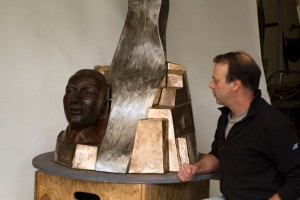City officials announced plans to highlight Ithaca’s influence on African-American history with the Martin Luther King Jr. Freedom Walkway at a launch party Nov. 16. Now the city is looking for ways to further fund the project.

Plans for the walkway include a self-guided tour with sculptures, benches and markers along the public sidewalks to designate important sites in African-American history. The walkway will cover two routes in downtown Ithaca, with plans to expand the walkway throughout the entire city in the future.
Leslyn McBean-Clairborne, chair of the Martin Luther King Freedom Walkway Committee, said the project is the result of a nearly four-year debate over the proper way to commemorate the late civil rights leader.
She said in 2004, an Ithaca High School class drafted a petition to change State Street to Martin Luther King Jr. Street, but faced opposition from the community. She said two years ago the city decided to dually name the street, and discussion of the walkway project began.
Leslie Chatterton, neighborhood and historic preservation planner for the city’s Department of Planning and Development, said the walkway is still being planned with the goal now being to find money before final logistical decisions are made.
“We’re still in a pretty conceptual phase,” she said. “Another purpose of the launch party was just to let people know that this is a real thing, and it was also an opportunity to cultivate some other funding sources.”
McBean-Clairborne said she hopes the walkway will generate pride in the city’s heritage and benefit the community economically by bringing in more visitors.
“Ithaca is known for its eccentricities,” she said. “It is known for its progressiveness and for being enlightened, and what a tribute to add to all those accolades the city has gotten with saying: ‘Here’s another place where we can be a leader.’”
McBean-Clairborne said the walkway will not be limited to figures in African-American history, though. Eleanor Roosevelt, a former first lady who dedicated the Southside
Community Center and advocated for civil rights, and others will also be featured on the route.
“What we are talking [about] is anyone who had some significant role in making the life and history of African-Americans here in Ithaca valid,” she said.
McBean-Clairborne said the committee has a goal of $500,000 for the project funding. The committee received a $20,000 contingency fund from the city during the planning stages and is now asking for donations and government grants.
“What we don’t want to do is start a [route] and not be able to finish it,” she said.
A visible part of the project is a sculpture that will be placed between the two routes featuring a statue of Martin Luther King Jr.
Rob Licht, the sculptor and former assistant professor of art at Ithaca
College, said the piece will feature King’s bust in front of a carved waterfall on a base inscribed with King’s quote: “We will not be satisfied until justice rolls down like waters and righteousness like a mighty stream.”
“The waterfalls are a constant reminder that justice is a goal,” he said.
Licht said the sculpture also requires additional funding aside from about $2,000 he got from the walkway committee. The $25,000 piece will also be funded through private donations independent from the walkway project.
McBean-Clairborne said the walkway will enable Ithaca to honor history that has been neglected in the past.
“Just that pride in recognizing this history and recognizing its place in this community is priceless,” she said.







